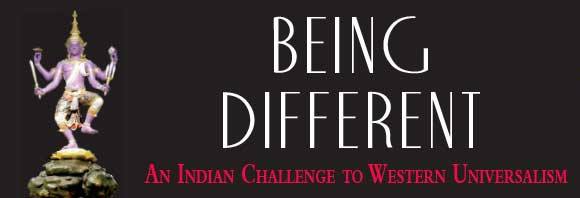Being Different makes it astoundingly clear that the ‘global’ civilization today is actually nothing of the kind. It is not an integrative fusion of beneficial ideas and perspectives from every civilization across the globe. It is, instead, a swallowing up of all human endeavor and culture for the nourishment of a madly materialistic, ultimately unsustainable, wildly destructive credo of monolithic cultural, political and religious imperialism. Rajiv Malhotra maintains that this is nowhere more clearly manifest than in the case of the centuries-long Western appropriation, re-mapping, and eradication of the sources of the native traditions, sciences, and spiritual practices of India.
Being Different boldly deconstructs the ubiquitously lauded tenet of ‘religious tolerance,’ so widely celebrated by diverse groups, and reminds us that none of us would want to be merely tolerated in any other situation and that mutual respect is what we should be aiming at. But it is made clear that this is a very difficult proposition because mutual respect in the realm of religion entails the affirmation of other faiths and their modes of worship as equally valid spiritual paths. This would mean the complete overturning, at the deepest level, of foundational dogmas of strict exclusivism that underlie historically orthodox Western theologies (an occurrence that liberal theologians would applaud). The volume similarly unpacks the far more insidious dangers of the seemingly innocuous idea of ‘universalism’ and delineates the difference between ‘universalism’ in Dharma-based civilizations and in its Western iteration. It does so by clarifying how ‘universalism,’ from the perspective of Hindu or Buddhist Dharma (through their own respective doctrines), is supported by concepts that acknowledge unity through its manifestation as diversity. In contradistinction, Western concepts of universalism carry critical dangers for non-dominant cultures because it confuses Universalization with Westernization, the expansion of which has involved the digestion of ‘useable’ elements from alternate civilizations. The volume warns that when such a confusion of categories is imbibed by non-Western peoples, it turns them into prey for the ascendant culture. While the book focuses on India and its intellectual and spiritual traditions, the same warning holds for all existentially struggling civilizations.
In Being Different, Rajiv Malhotra unapologetically holds up a mirror to dominant models of Western secular and religious culture and, perhaps most importantly, provokes introspection for those whose spiritual heritage lies —whether by ancestry or adoption—in the vast and diverse civilizational spheres birthed in the pluralistic environment of the Dharma traditions.


